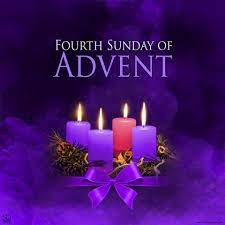HOMILY FOR THE FOURTH SUNDAY OF ADVENT, YEAR C
DO NOT DOUBT THE PLACE GOD HAS FOR YOU
Fr. Ugochukwu Ugwoke, ISch
Readings: Micah 5:1-4, Hebrews 10:5-10, Luke 1:39-45
Today
is the fourth Sunday of Advent and the very last week of our waiting and
preparation for the coming of the Lord. As we light the last candle in our
Advent wreath today, the readings of this Sunday, especially the first and
gospel readings draw our attention to the fact that God’s standards are totally
different from human standards. The readings remind us of how God has always
done highly unlikely things in highly unlikely places using highly unlikely
human instruments. One of the places that we find this eloquently portrayed is
in the birth of Christ.
In
the first reading, we read about the prophecy of Micah concerning the birth of
the Messiah, the one who is to rule over Israel (Micah 5:1). In that passage,
Micah prophesied that the Messiah would come from Bethlehem of Ephrathah, the
smallest of all the clans of Judah. This prophecy came to fulfillment when
Jesus was born in Bethlehem of Judea. As the king of the Jews, one would have expected
that Jesus would be born in Jerusalem, a holy city and place of worship. But to
the amazement of all but in accordance to the will of God, Jesus was rather born
in Bethlehem, a town too insignificant to be among the clans of Judah (Micah 5:1-2).
The name Bethlehem means “house of bread.” It is therefore no coincidence that God
chose the House of Bread to be the place that his Son, the Bread of Life that
would one day be broken for us, would be born (John 6:32-35).
Truly,
when we take a look at all the events surrounding the birth of Jesus, one thing
we will notice is that every aspect of Jesus’ coming into the world was both
physically and socially abnormal. But every single of those aspects about the
Lord’s birth is a pointer to the sovereign plan of God from of old. In choosing
the mother of his Son, God overlooked the rich and influential families, and
went to the village of Nazareth, to Mary, a peasant girl from a poor background
(Luke 1:26-54). God chose to put the fate of his Son on earth in the hands of a
young woman, not yet married. As St. Paul says, “God chooses what the world
considers foolish, to shame the wise; he chooses what the world considers weak
to shame the strong. He chooses the lowly and the despised things of this
world, even things that are not, to bring to nothing things that are” (1 Cor.
1:27-28).
Bethlehem
was an insignificant city, but God chose it as the place from where he will
raise his Son. Mary did not have a blue blood, but God chose her to be the
mother of his Son. In the time of Jesus, shepherds were commoners with no power
or prestige. They lived in the fields with their animals. Yet, it was to them
that God announced for the first time, the news of the birth of Jesus.
As
we wait for the Lord’s coming in history and in majesty, let us bear in mind
that in our time, God still does many strange things like the types we see with
Bethlehem and Mary. While we dismiss some people as being beyond the call of
God, God still reaches out to them. While we look at each other and see
weakness and failing, God sees opportunity to develop another good servant. Even
when we see ourselves as unqualified, inexperienced and lacking talents or when
it is the case that others have written us off, God may still entrust to our
hands, his greatest treasure as he did with Mary at Bethlehem. Never doubt the
place that God has for you.



Comments
Post a Comment